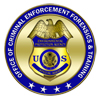Criminal Provisions of the U.S. Criminal Code (Title 18) and Other Statutes

On this page are general descriptions of the criminal provisions under the U.S. Criminal Code (Title 18) and Other Statutes.
Conspiracy
False Statements
Mail/Wire Fraud
Endangered Species Act of 1972
Migratory Bird Treaty Act of 1918 (MBTA)
National Forests & National Park Service Lands
U.S. Criminal Code (Title 18)
Conspiracy
Elements:
- Two or more persons
- Entered an unlawful agreement;
- Defendant knowingly and willfully became a member of the conspiracy;
- One of the co-conspirators knowingly committed at least one overt act;
- Overt act was committed to further some objective of the conspiracy
- Entered an unlawful agreement;
Statute: 18 U.S.C. 371
Penalty:
- 5 years and/or fine under 18 U.S.C. 3571
False Statements
Elements:
- A person
- Knowingly or willfully
- Made a written or oral statement
- Statement was false, fictitious, or fraudulent
- Statement was made within the jurisdiction of federal agency
- Statement was material
- Knowingly or willfully
Statute: 18 U.S.C. 1001
Penalty:
- 5 years and/or fine under 18 U.S.C. 3571
Mail/Wire Fraud
Elements:
- A person
- Knowingly or willfully
- Devising or attempting to devise a scheme or artifice to defraud
- Participate in the scheme with the specific intent to defraud
- Use of the mails or interstate wire communications in furtherance of the scheme
- Knowingly or willfully
Statute: 18 U.S.C. 1341 (mail) and 18 U.S.C. 1343 (interstate wire)
Penalty:
- 5 years and/or fine under 18 U.S.C. 3571
The Endangered Species Act of 1973
Elements:
- Any person
- Knowingly
- Imports, exports, takes, transports, sells, purchases, or receives in interstate or foreign commerce any species listed as endangered or threatened
- Knowingly
Statute: 16 U.S.C. 1540(b)
Penalty:
- Criminal misdemeanor penalties of up to 1 year imprisonment and fines pursuant to a maximum of $50,000
Migratory Bird Treaty Act of 1918 (MBTA)
Elements:
- Statute: 16 U.S.C. 707(a) Misdemeanor Offense
- Any person, association, partnership, or corporation who
- Violates or fails to comply with any provisions or regulations of the MBTA
- Shall be deemed guilty of a misdemeanor
- Statute: 16 U.S.C. 707(b) Felony Offense
- Any person who
- Knowingly
- Takes any migratory bird
- With intent to sell, offer to sell, barter, or offer to barter
- Any migratory bird
- Shall be guilty of a felony
Penalty:
- Misdemeanor offenses shall be fines a maximum of $5000 and or imprisoned for not more than six months for individuals, or $10,000 fine for an organization.
- Felony offenses shall be fined maximum of $250,000 and/or imprisoned for not more than two years for an individual or $100,000 for an organization.
- All guns, nets, traps, and other equipment vessels, vehicles, and other means of transportation used by any person while pursuing, hunting, taking, trapping, ensnaring, capturing, killing, or in making any attempt thereof shall be forfeited to the United States and held under the authority of the Secretary of Interior.
National Forests & National Park Service Lands
Elements:
- Statute: 16 U.S.C. 551 National Forest System Lands
-
- The Secretary of Agriculture shall make all provisions for the protection against destruction by fire and depredation upon the public forests and national forests which have been or may be set aside under the provision of section 471 of this title; he may make such rules and regulations in regards to their occupancy and use to preserve the forests from destruction.
- Statute: 36 CFR 261.9 Property
- The following are prohibited:
- (a) Damaging any national feature or other property of the United States
- (f) Using any pesticide except for personal use as in insect repellant or as provided by special-use authorization for other minor uses.
- (g) Digging in, excavating, disturbing, injuring, destroying, or in any way damaging any prehistoric, historic, or archeological resource, structure, site, artifact, or property.
- (f) Removing any prehistoric, historic, or archeological, resource, structure, site, artifact, or property.
- (g) Excavating, damaging, or removing any vertebrate fossil or removing any paleontological resources for commercial purpose without a special use authorization.
- The following are prohibited:
- Statute: 36 CFR 261.11 Sanitation
-
- The following are prohibited:
- (b) Possessing or leaving refuse, debris, or or litter in an exposed or unsanitary condition.
- (c) Placing in or near a stream, lake, or other water any substance which does or may pollute a stream, lake, or other water.
- (d) Failing to dispose of all garbage, including any paper, can, bottle, sewage, waste water, or material, or rubbish either by removal from the site or area or by depositing it into receptacles or at places provided for such purposes.
- (e) Dumping of any refuse, debris, trash or litter brought as such from private property or from land occupied under permit, except, where a container, dump or similar facility has been provided and is identified as such, to receive trash generated from private lands or lands occupied under permit.
- The following are prohibited:
Statute: National Forests (36 C.F.R. part 200), National Grasslands (36 C.F.R. part 213), National Recreation Areas administered by the U.S. Forest Service (36 C.F.R. part 292), and National Wild and Scenic River System areas within Forests Service Jurisdiction (36 C.F.R. part 297)
Penalty: Any person who violates the provisions of this section shall be fined not more than $500 and/or imprisoned for not more than six months. Under Title 18, maximum fine is $10,000 for companies and $5,000 for individuals.
